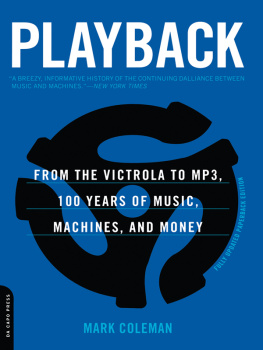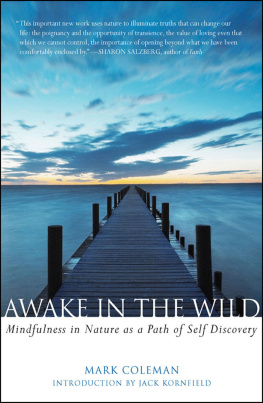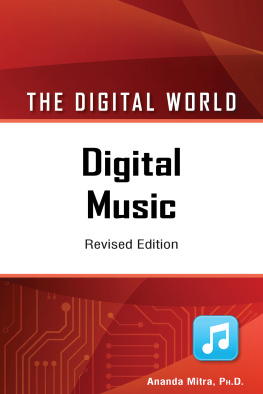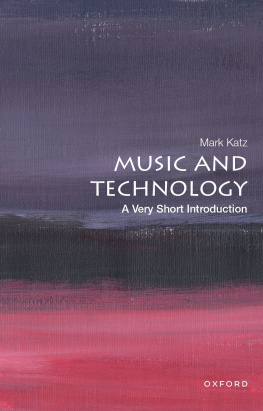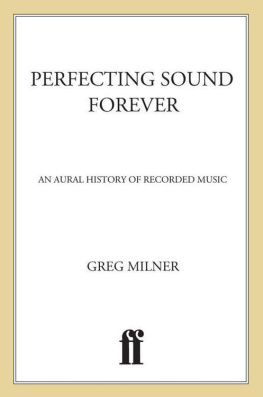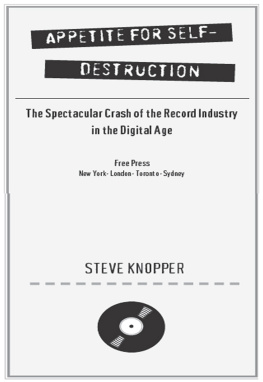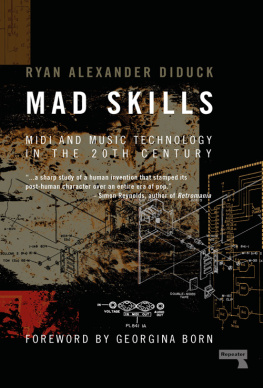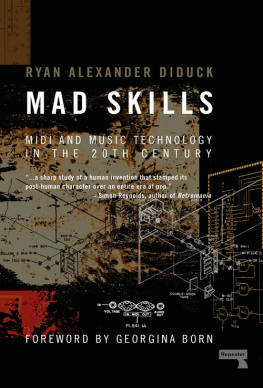Playback
PRAISE FOR PLAYBACK
Playback is a breezy, informative history of the continuing dalliance between music and machines.
New York Times
Comprehensive, well-researched and thoroughly engaging... Playback traces the development of musical technology from wax cylinders to iPods and revealingly illustrates how, with each new innovation, reactionary forces in the business panicked, cried wolf and tried to shut it all down.
Chicago Sun-Times
Dissecting 126 years of recorded music through the prism of technology is no easy task, but Coleman manages it admirably... Playback is full of fascinating riffs on sound machines, from Edisons phonograph to Apples iPod.
Rolling Stone
A sharp, static-free overview of the evolution of audio technology.
Boston Herald
Short and sweet... consistently excellent and authoritative.
Publishers Weekly
[Colemans] expertise in the area of popular music shines through... may well be indispensable.
Library Journal
Playback
From the Victrola MP3, 100 Years of Music, Machines, and Money
MARK COLEMAN
Copyright 2003 by Mark Coleman
Aftermath copyright 2005 by Mark Coleman
Excerpts in from An Interview with the Father of Hi-Fi: Dr. Peter Goldmark by Edward Zwick from Rolling Stone, 1973 Rolling Stone LLC. All rights reserved. Reprinted by permission.
All rights reserved. No part of this publication may be reproduced, stored in a retrieval system, or transmitted, in any form or by any means, electronic, mechanical, photocopying, recording, or otherwise, without the prior written permission of the publisher. Printed in the United States of America.
The Library of Congress has cataloged the hardcover edition as follows:
Coleman, Mark, 1957
Playback : from the Victrola to MP3, 100 years of music, machines, and money / Mark Coleman.
p. cm.
Includes bibliographical references (p. ) and index.
ISBN 0-306-80984-2 (hardcover : alk. paper)
1. Sound recording industryHistory. 2. Music and technology. I. Title.
ML3790.C65 2004
621.389'3'09dc22
2003024998
First Da Capo Press edition 2003
First Da Capo Press paperback edition 2005
ISBN 0-306-81390-4 (pbk.)
eBOOK ISBN: 9780786748402
Published by Da Capo Press
A Member of the Perseus Books Group
http://www.dacapopress.com
Da Capo Press books are available at special discounts for bulk purchases in the U.S. by corporations, institutions, and other organizations. For more information, please contact the Special Markets Department at the Perseus Books Group, 11 Cambridge Center, Cambridge, MA 02142, or call (800) 255-1514 or (617) 252-5298, or e-mail .
Text design by Jeff Williams
Set in 10.5-point Sabon MT by the Perseus Books Group
1 2 3 4 5 6 7 8 908 07 06 05
For Susan and Miles
ACKNOWLEDGMENTS
MY DEBT TO THE WRITERS, editors, engineers, producers, scientists, and academics credited in the bibliography is gigantic. Their visionary body of work forms the core of Playback.
Tribute must be paid to the tireless staff of the the New York Public Library of the Performing Arts at Lincoln Center. At the librarys temporary home on West Forty-third Street, I was afforded space to plug in my laptop day after day with no questions asked, and every one of my arcane and convoluted queries was answered. The story of popular culture in America resides in this amazing collection.
Exhibiting the patience of a saint, Leonard de Graf at the Edison National Historic Site let me examine rare documents and unearthed precisely the vintage photographs I needed.
My debt to my editor, Ben Schafer, is incalculable. Without his questions and guidance, musical sense, and literary sensitivity, Playback would be tangled up in my head somewhere. Thanks for all your hard work.
Thanks to Andrea Schulz for taking that first leap of faith, and to Jane Snyder for reading my first draft.
Counting accomplished writers among your friends certainly doesnt hurt when youre writing a book. Still, nothing could have prepared me for the generous response of my colleagues and confidants. David Fricke provided a staggering flow of source material, finding crucial texts for several chapters. And special thanks to Susan Klimley for steering me to Ray Kurzweils Life Cycle of a Technology. Chapter 8 wouldnt exist without David Browne. David donated voluminous notes and files on the subject: a treasure chest of facts, anecdotes, leads, tip-offs, and juicy tidbits. Betsy Israel graciously came to my aid with a model for my bibliography. Thanks for the photo tips, too.
I wouldnt be able to write a word without the support and guidance of my family. Larry and Lee Ramer, my second parents, offered tons of emotional support along with a clean, well-lit space to work. Your generosity truly knows no bounds. The interest and encouragement of the rest of my immediate family kept me going for four long years. Thank you to John, Nancy and Gary, Stephanie, Doug and Michelle for never tiring of asking the question, Hows the book going?
Simply put, Playback would not exist without Susan Ramer. As my literary agent, Susan has every quality a writer needs: tact, insight, integrity, and determination. She fought for this project every step of the way, offering solid editorial and commercial advice and maintaining enthusiasm when the going got tough. And as my wife, Susan was obliged to live and breathe my book even when she wasnt at the office. Throughout this incredible balancing act, she never faltered. Susan helped me formulate my book while keeping the focus on our family life. I couldnt ask for more loving inspiration.
Sadly, my most loyal and least critical readers wont get to see this book. My parents, James and Mary Louise Coleman, left me a great legacy: a love of literature, boundless intellectual curiosity, the courage to question conventional wisdom. And my uncle, Thomas Coleman, paved the way by being the first writer in our family. My only regret is that you all didnt live to read this acknowledgment.
INTRODUCTION
SUDDENLY, POPULAR MUSIC RESEMBLES an alien landscape. The great common ground of the last fifty years or so now looks strange and forbidding, perhaps even treacherous. Of course, the music constantly changes. Take the most obvious example: To ears raised on rockthat is, attuned to melody and alert to message the rhythm-defined sound and defiant stance of current hip-hop registers as a grim and impenetrable throb. This is part of a timehonored tradition; parents arent expected to understand their childrens enthusiasms. But the current crisis isnt about evolving musical tastes, abrupt stylistic shifts, or even the longdelayed graying of the Pepsi Generation. Rather, todays generations divide over how they listen to music, not what kind of music they enjoy. In the twenty-first century, radical advances in music technology threaten to overshadow the music itself.
The changes have been rapid and unsettling, pervasive and somewhat perverse. Prerecorded music no longer arrives enclosed (or embalmed) in a prepaid plastic disc. The iconic album format is obsolescent, if not already obsolete. Compact discs, the solid gold standard of music delivery, suddenly seem clunky and redundant (not to mention obscenely overpriced). That sacred shrine, the stereo system, has been dismantled if not defiled, its function consumed by the all-conquering home computer. For a new generation of listeners, pop songs represent yet another choice on a limitless entertainment menu: more eye-reddening text aglow on the monitor screen.

